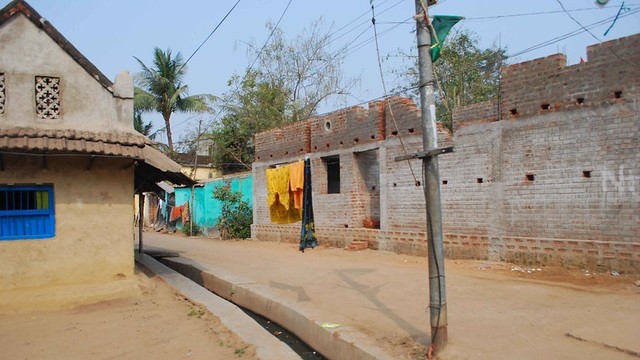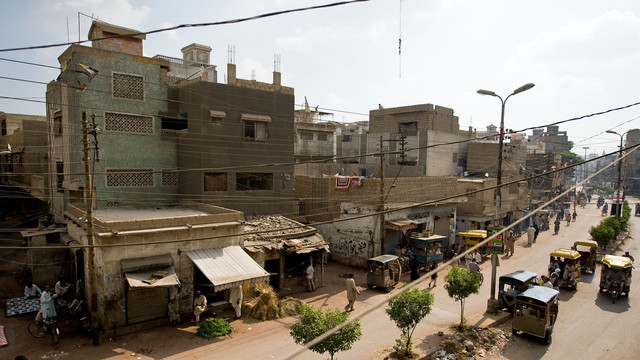Co-producing urban innovation from the bottom up
Finding alternatives to eviction: Teresa Corcoran reports on how urban poor organisations are working with local authorities to make cities more inclusive and resilient.

Surveying residents in low-income housing in Vijinapura, India. Receiving accurate data about slums can help local authorities plan solutions (Photo: cstepin, Creative Commons via Flickr)
An IIED-hosted event during the Habitat III conference in Quito heard how organised communities from informal settlements ("slums") are finding their own solutions to evictions and relocation that are exacerbated by threats of extreme weather events – and set to become more frequent and intense as a result of climate change.
Often built on steep slopes, next to rivers or along exposed coastlines, these informal settlements are already vulnerable to events such as floods, storms and drought. Poor planning, weak infrastructure and increasingly dense populations leaves these neighbourhoods unable to withstand, and recover from, climate shocks and stresses.
For city governments, that typically see informal settlements as an unwelcome problem, the go-to solution for dealing with vulnerability is to demolish homes and evict its residents – despite the fact this is where they, and previous generations, may have lived for many years.
However, participants heard how urban poor organisations are working with local governments to find alternatives to eviction – upgrading slums, equipping them with more basic services and stronger infrastructure.
One way is through community mapping, providing local government with data on services and infrastructure within the slum.
"You can't go to the local authorities and tell them you need toilets, waters taps, street lights or drains and flood defences without knowing first how many of these provisions are in place. When you can show the authorities the gaps, through specific information from the slum, they know where they need to put their resources," said Sarah Nandudu of Shack/Slum Dwellers International (SDI), an international network of urban poor organisations.
This process also helps to strengthen relationships with city authorities.
"We work with local governments to analyse and verify the data, making them aware of problems they didn't know about," she added. "This not only gets services to where they are most needed, it gains us respect with local government, enabling us to work more closely together. Providing this credible data gives us slum dwellers power."
In addition to data collection, these organisations are helping to finance the upgrading of their own settlements. As part of self-organised savings groups, household savings from the community are pooled and then blended with funds from local authorities and development assistance agencies to provide these services. This happens when SDI national affiliates set up city development funds that offer subsidised loans to member organisations.
By guiding authorities on where services are needed, inputting into the design of new infrastructure and contributing to the financing, the community is at the centre of resolving the challenges faced by informal settlements.
"Slums are part of the city and yet the city regards slums as a problem," said Nandudu. "By organising ourselves into savings groups and providing local governments with reliable, relevant data about the slums' needs, we're tackling the challenges ourselves. We know the city sees us as a problem – and this is why we are helping our city find solutions."
Joining the panel, IIED's director Andrew Norton noted that building resilience into these settlements in this way is imperative as the threats of climate change intensify.
"The impacts of extreme weather events such as major floods, droughts and storms receive much of the world's attention. But often overlooked is the day-to-day disruption that climate change is causing to the lives of ordinary people, particularly those living in densely populated informal settlements on the margins of the world's cities.
@andynortondev: engaged local media can be powerful tool for getting voice of local actors heard in community devlopmt & upgrading processes
— IIED (@IIED) October 18, 2016
"It's inspiring to hear these innovative ways of how organised communities are building effective links with local administration, developing finance mechanisms to support the development of their own communities and finding alternatives to eviction.
"By actively contributing to the development and financing of their own settlements, organisations such as SDI are demonstrating practical strategies to realise the ambition of Habitat III to make our cities more inclusive and resilient."
Teresa Corcoran (teresa.corcoran@iied.iorg) is content officer in IIED's Communications Group.



